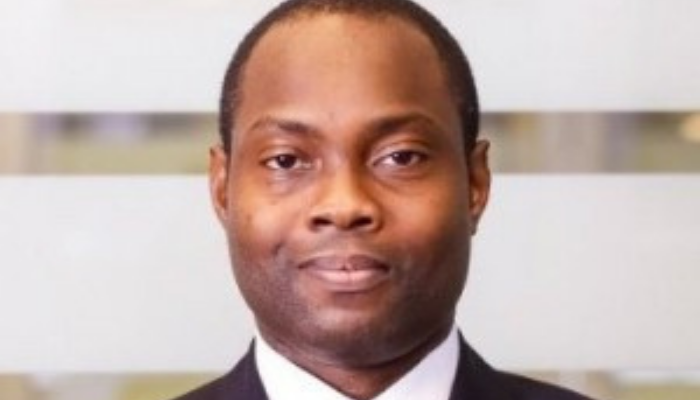“Our next phase of growth is execution, helping clients solve challenging problems”
JUBRIL ENAKELE became the CEO of Iron Capital Partners Limited (Iron Capital) in May 2019 after the end of his meritorious 4-year contract with Quantum Zenith. In this interview with ADEMOLA ASUNLOYE, of BusinessDay Research and Intelligence Unit (BRIU), the research arm of BusinessDay, JUBRIL shared his background with him and his transitioning into Iron Capital, an Africa-focused corporate finance and financial advisory firm that signed a referral partnership with the government of Australia Investment and Trade Commission, Austrade in 2020. Excerpts:
Looking at your profile you used to be Head of Deutsche Bank AG’s Corporate Finance and Treasury Solutions team for Africa in London. What motivated you to return to Nigeria and how have you found the experience?
Growing up, I learned that home is not where you come from, it is where you return. Even when I was in Europe, a part of me always knew that I would return home. For me, it was returning to create impact and to help move Africa (and Nigeria in particular) forward by making my little contribution. Interestingly, the best way I could achieve that is through providing financial solutions.
I had the privilege of returning to work for Zenith Capital Limited, now Quantum Zenith Capital and Investment Limited, on a 4-year contract. There, I learnt a lot about managing diverse inter-related businesses while working and running an investment banking franchise within a commercial banking culture. I am grateful to my former team at Quantum Zenith Capital who are stand up professionals. I am especially grateful to Jim Ovia for the opportunity he gave me to express myself using the platform of Quantum Zenith. The experience prepared me for bigger challenges now and going forward.
The last time we met, you were CEO of Zenith Capital Limited, and I remember that you won an award, you have since moved on to Iron Capital. Could you tell us about that?
I was very pleased to have won the BUSINESSDAY’s deal advisor of the year award in 2018. It was special to us and a testament to the amount of work the entire team put in. For us, it was validation that all the hard work we had put in was recognized, not just internally but also by the larger finance ecosystem.
My contract which ended in April 2019 with Quantum Zenith Capital was a defining moment for me. As a banker for over 20 years, I had options of doing different things but I felt it was time to run my own firm. So, Iron Capital became operational in May 2019. Fortunately, we had our first transaction, an M&A transaction, which we closed in less than 8 weeks. We have since put systems and structures in place.
We are an Africa-based, Africa-focused corporate finance and financial advisory firm. Between May last year and today, we have become actively involved in deals in Nigeria, Liberia, Ghana, Kenya, Equatorial Guinea, and South Sudan. The vision here is to execute transactions to the best and highest possible global standards. I tell my colleagues that if our work at Iron Capital when compared to those of the bulge bracket global investment banks have a noticeable difference, then we have failed in meeting those standards.
Read also: Okomu, Unilever, Zenith, others cause stock market’s new lows
What is your biggest fear as a startup running your own business?
My biggest fear starting this is to be considered average. We must be the best in class. Our experience has been an interesting one, even though it hasn’t been easy. Starting up a business was a lot more difficult than I thought. Now, we have weathered the storm and are well positioned for the future. Earlier this year Iron Capital signed a referral partnership with the Government of Australia through its Australian Trade Commission (Austrade), with the aim of establishing a presence in the continent.
How does that impact Africa’s business community?
The referral partnership is a big step for Iron Capital. If Australian companies are interested in doing business in Africa or in those four countries we have been approved for—Nigeria, Ghana, Kenya and Zambia, and they require financial advisory services, corporate finance services, relationship management or strategic thinking around entry/exit or any of those operations that are looking to those markets; we as a referral partner will be engaged by them.
It also works the other way. For instance, if Africa businesses in any of those four countries are interested in engaging with specific Australian companies, we can help facilitate that. it is quite beneficial because it gives businesses in Africa, particularly in the countries that we cover, the opportunity to expand into other markets, to receive other technical assistance or enter technical partnerships with larger companies in Australia and vice-versa. It is also beneficial to African Sovereigns.
Given the effect of COVID-19 which has crippled many businesses in Nigeria and across the globe, how has It impacted the way you do business in Nigeria and across Africa?
As a corporate finance and advisory firm, if the pandemic affects our clients then it gets to us too. For instance, if the demand for your product is affected, it means that you will not be able to pay for certain obligations like the services we provide, even though a dislocation between demand and supply sometimes bring opportunities for certain people.
Coming out of this, I think a lot of companies will seek professional financial advice to help reposition their businesses, raising an opportunity for firms like ours to step in and offer professional advice to their clients.
What has your entrepreneurial experience been like, especially given the backdrop of COVID-19 and fallen oil prices?
This is the first time I am starting my own firm. As a banker for twenty years, I have never had a side hustle. Last year was the first time I setup my own business. One would think that twenty years of working in Nigeria, London, Istanbul, Turkey, Johannesburg, South Africa would have prepared one for everything, it does not. I studied in Nigeria; I hold a Master’s degree in Public Policy from University College London. I hold certificates in corporate finance, and in Advanced Management and Leadership from London Business School and University of Oxford Säid Business School respectively. All these combined do not adequately prepare you for the challenge of entrepreneurship. You need to get into it and be prepared to learn as you go.
My experience has been full of lessons from setting up the office, to hiring the right staff (for competence, attitude, relationships etc), getting the right software, paying salaries, dealing with regulators, etc. are considered frontier world problems. The most important lessons I have learnt in my entrepreneurial journey so far are the need for tenacity, managing successes and disappointments. Also, be prepared to pivot if necessary.
What can you say about the investment banking landscape in Nigeria in the last one year till date given that the sector is very important because there are no way companies can raise funds or capital whether through IPO or M&A without the involvement of institutions like advisors, brokers? Can you place a value on the deals executed by the players?
I think the investment banking landscape in Nigeria is getting a lot more interesting and I am pleased to see that there are a lot of more indigenously owned players in the market in addition to the traditional commercial banks, merchant banks, international institutions, and Non-Interest (sharia compliant) banks playing in the space. I am really pleased to see more private equity firms that are locally based and managed by Nigerians.
Another interesting noteworthy introduction to our system here is the emergence of strong regional DFIs that also provide debt and in some cases equity through different vehicles. That helps improve liquidity in the system unlike the usual IPO.
Another interesting introduction since we spoke is the emergence of institutions that provide credit enhancements for transactions. These institutions help derisk transactions which make it easier for lenders, mostly fund managers, pensions funds and insurance companies to participate in deals.
What advice would you give to aspiring entrepreneurs in Nigeria?
Although entrepreneurship is a fulfilling experience, things don’t always go according to plan. It is important that you can respond to changes and pivot if necessary. Adequate capital is also very important. Capital takes various forms – financial, relationship, people skills etc. Relationships are very underappreciated in the life of a successful entrepreneur. You must be in the position where you have the right kind of relationships and connections that will help you generate businesses and solve problems. Also, the ability to attract the right talent is unappreciated but certainly not one to take for granted. Finally, if posible start with a partner, and not alone. It’s easier if you have someone to share the load.
I am not only the CEO, I am the chief culture officer, I manage operations, culture and standards, I am the HR person and even the chief training officer etc. Be prepared to wear more than one hat.
Based on the experience, challenges and successes you have had, where do you see yourself in the next 6 months to 1 year?
We want to build the most trusted indigenous corporate finance and financial advisory firm on the continent. We spent the last year putting structures in place and getting in the right talent to support the business in the next phase of growth—execution of deals.
What advice would you give to young professionals?
I will put this in three different buckets: As a new entry with less than 1 to 5 years of experience, learn. Work for an institution that helps you to learn. Focus on learning rather than the pay. At a middle management level between the ages of 5 to 15 years, you need to focus on competence and people skills—these include juniors, peers and seniors. You need to also have a sponsor. By that, I mean someone in the room that will give a good account of your work whenever your name comes up on the table. Finally, at the senior management level no one is doubting your competence anymore nor your relationships. At this level it’s about managing shareholder and stakeholder relationships, within and outside the firm. At this level it also important that you position yourself as a sponsor.


